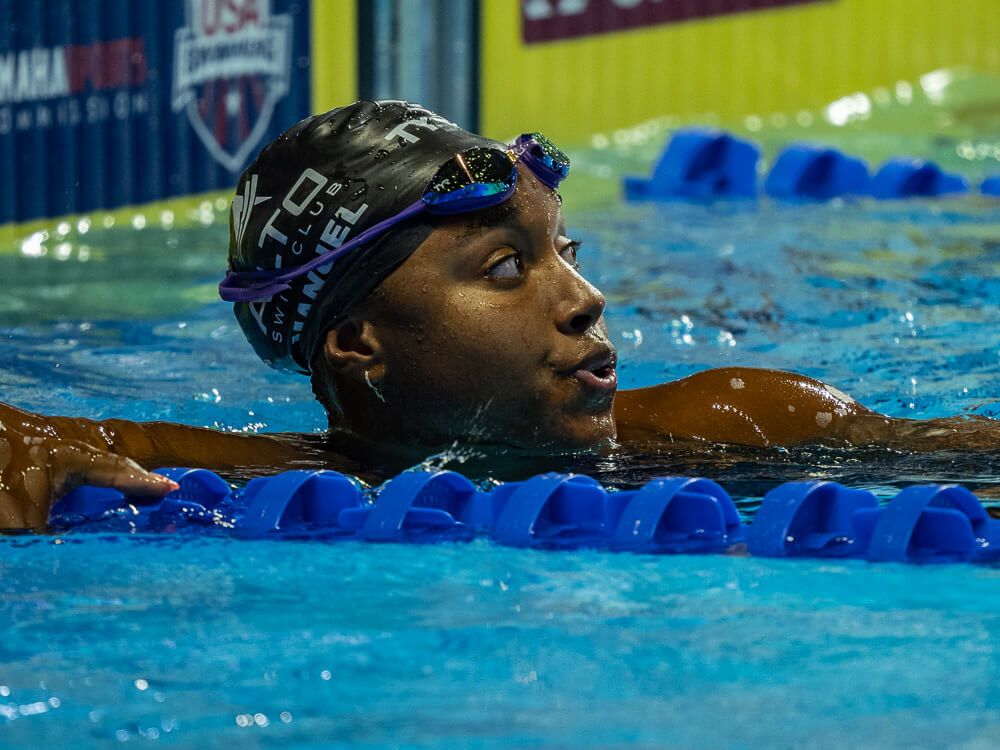Simone Manuel Won’t Defend 100 Free Olympic Title After Battle with Overtraining Syndrome

Simone Manuel Won’t Defend 100 Free Olympic Title After Battle with Overtraining Syndrome
2016 Olympic gold medalist Simone Manuel missed the women’s 100 free final at the U.S. Olympic Trials, finishing ninth and missing the top eight by just two hundredths of a second. Manuel put up a time of 54.17, just behind Erika Brown’s eighth-place time of 54.15.
Prior to the race, the NBC television crew of Mike Tirico and Rowdy Gaines revealed that Manuel missed three weeks of training in April and went home to Houston. Later in the evening, Manuel spoke with the press and revealed that she was diagnosed with Overtraining Syndrome in March after having difficulties in practice and simply feeling tired at all times. The issues began in January, and shortly after, “my body kind of crashed.”
Manuel tried to modify her training and stay in the pool, but when that yielded no progress, Manuel missed three weeks of training in April before returning to Stanford to resume training, at the suggestion of her doctor and of Stanford coach Greg Meehan.
“It is definitely hard for me to be sitting up here. I feel like I want to share my story, what I have been through this past year, especially the past couple months. It has not been easy by any stretch,” Manuel said. “I knew that every race that I was going to have at this meet was going to be more of a challenge than it has been in the past.
I think we saw what happened, I placed 9th. I haven’t quite processed it completely, but the one thing I have processed is that I am proud of myself, and I did everything I possibly could have done to set myself up to be my very best at this meet, and that 54 — I don’t even know what the time was, was as best as I could be today and in this moment. That’s a tough pill to swallow, but I think what makes it easier to swallow is I simply — I really went out there, and I did my best.”
Barring any shocking scratches, Manuel is out of the 100 free for the meet, and the 50 free will be the only event remaining on her Trials program. Manuel is the reigning world champion in the 50 free in addition to her two straight world titles in the 100 free. She also holds the American record in the 100 free at 52.04, and she is the third-fastest performer ever in that event. Manuel missing the final sent ripples throughout the sprint world as she has become a staple in individual sprint finals and also the usual relay anchor on the American women’s 400 free and medley relays.
“My first date back training was April 17th. It was kind of one of those bittersweet moments where my body wasn’t doing what I knew it was capable of. I had moments where I didn’t even want to go to the pool because I knew it was going to be bad,” she said. “It was an uphill climb. Once I got back in the wate, some days were good, some days weren’t great. I could go on and on but to sit here and even do what I did and to be at this meet is something that I can’t take lightly.”
Manuel said that “the only way I got through it was talking to my loved ones and being surrounded by the support that they could give me, talking to my sports psychologist, openly talking to Greg and (assistant coach) Tracy (Slusser) about what I was feeling after each practice or if I had a down day.”
During her press conference, Manuel fought through tears as she reflected on this exceptionally challenging period in her career that has included feeling depression, anxiety, insomnia and soreness. Significantly, the setback forced Manuel to look at herself and realize she should be proud of herself, rather than constantly looking ahead to what was next and try to achieve more.
“I’m someone where when I have accomplished something, I’m always looking forward to the next thing,” she said. “I think sometimes I don’t sit back and appreciate what I’ve done. I think this was the first time where before I showed up at the meet, I was proud of myself. I think that was a big step. I hope that inspires more athletes to feel that way. I think most athletes, we’re not proud of ourselves when we accomplish something so great. And I’ve done it. I’m an Olympic champion. I know there’s more there. It’s a tough pill to swallow, but that’s what’s giving me peace. I know I did everything I possibly could to be here, and that made me proud because I continued to stay strong during this process, even when there were times I wanted to give up.”
Manuel admitted that the outside-the-pool issues of the past year, including the COVID-19 pandemic, the delay of the Olympic Games and the racial reckoning in the United States, could have been factors in pushing herself past the point of exhaustion.
“I think the pandemic could have played a part of it,” she said. “Being a Black person in America this past year has played a part of it. It is another factor that can influence you mentally in a draining way.”
Manuel explained she did not want to reveal her health issues at the beginning of the meet because she did not want anyone to feel sorry for her. She said she had no idea how she would perform at Trials, particularly after she swam a 53.8 100 free at a tuneup meet in Austin in May.
“I was just telling myself to believe,” she said. “To just go out there and race. I think I didn’t want people to feel sorry for me. I am confident that the path God has me on is the path I am supposed to be on. It is hard to have that faith, but that is what faith is.”
Manuel is still going to swim the 50 free, and she said, “I’m going to go for it.” She said that regardless of whether she made the Olympic team, she would have to take several months off from swimming if she wanted to fully get past the issue. And despite this latest setback, Manuel insisted that her swimming career is definitely not over, even if the odds of her qualifying for these Games are long.
“If your dream is important to you, you fight for it, but this definitely was my biggest fight,” she said as she teared up again. “Maybe it didn’t happen today, but this isn’t the last time you’re going to see me, and this isn’t the last time I’m going to do something great in the pool. I’m confident in that.”


- 2016 USA TRIALS ARCHIVE
- ARCHIVES OF OLYMPIC TRIALS VIA SWIMMING WORLD VAULT
- 2021 USA OLYMPIC TRIALS WAVE I CUTS
- 2021 USA OLYMPIC TRIALS WAVE II CUTS
- HEAD USA OLYMPIC COACHES
- 2016 FULL RESULTS
- WAVE I FULL RESULTS
- PSYCH SHEET
- DAY ONE RESULTS
- DAY TWO RESULTS
- DAY THREE RESULTS
- DAY FOUR RESULTS
- DAY FIVE RESULTS
- DAY SIX RESULTS
- DAY SEVEN RESULTS
- DAY EIGHT RESULTS




?
I mean… It’s been tough for all. 9th isn’t too shabby. Regroup and come back again.
Too bad. Such a great swimmer. Admirable. The best in the world during the Olympiad. She was the “giants killer” and my favorite for the Olympic 100 meters final. The others swam the fast times, and she came and beat them. What a racer! A prizefighter. Good luck for her 50 meters!
Diagnosis of overtraining syndrome? ?
I guess that the American Psychiatric folks will be excited to ad a new diagnosis to their burgeoning syndrome book.
When I swam in college, it was called “failing adaptation”, which I had. You train so hard, you’re constantly tired, even on your day off. Unfortunately, one of the symptoms is insomnia, so you can’t sleep. Your body breaks down, and no amount of rest seems to help. But since you have insomnia, you don’t get any rest/sleep anyway. Your body is past the point of recovery through rest.
Even after training stops, you feel the effects for weeks or months afterwards because your body is completely broken down. And that’s just the physical part-the psychological part is hard as well.